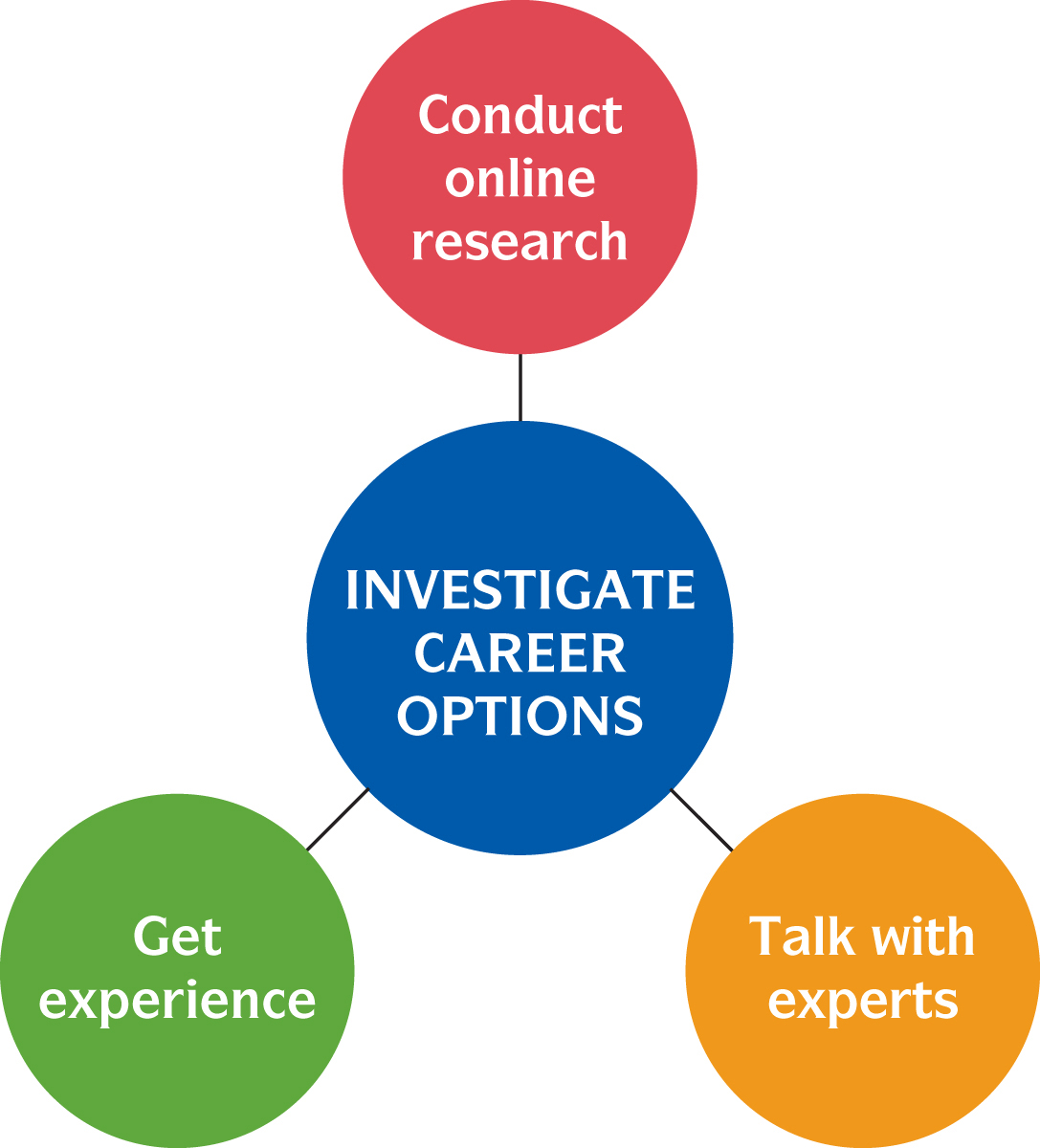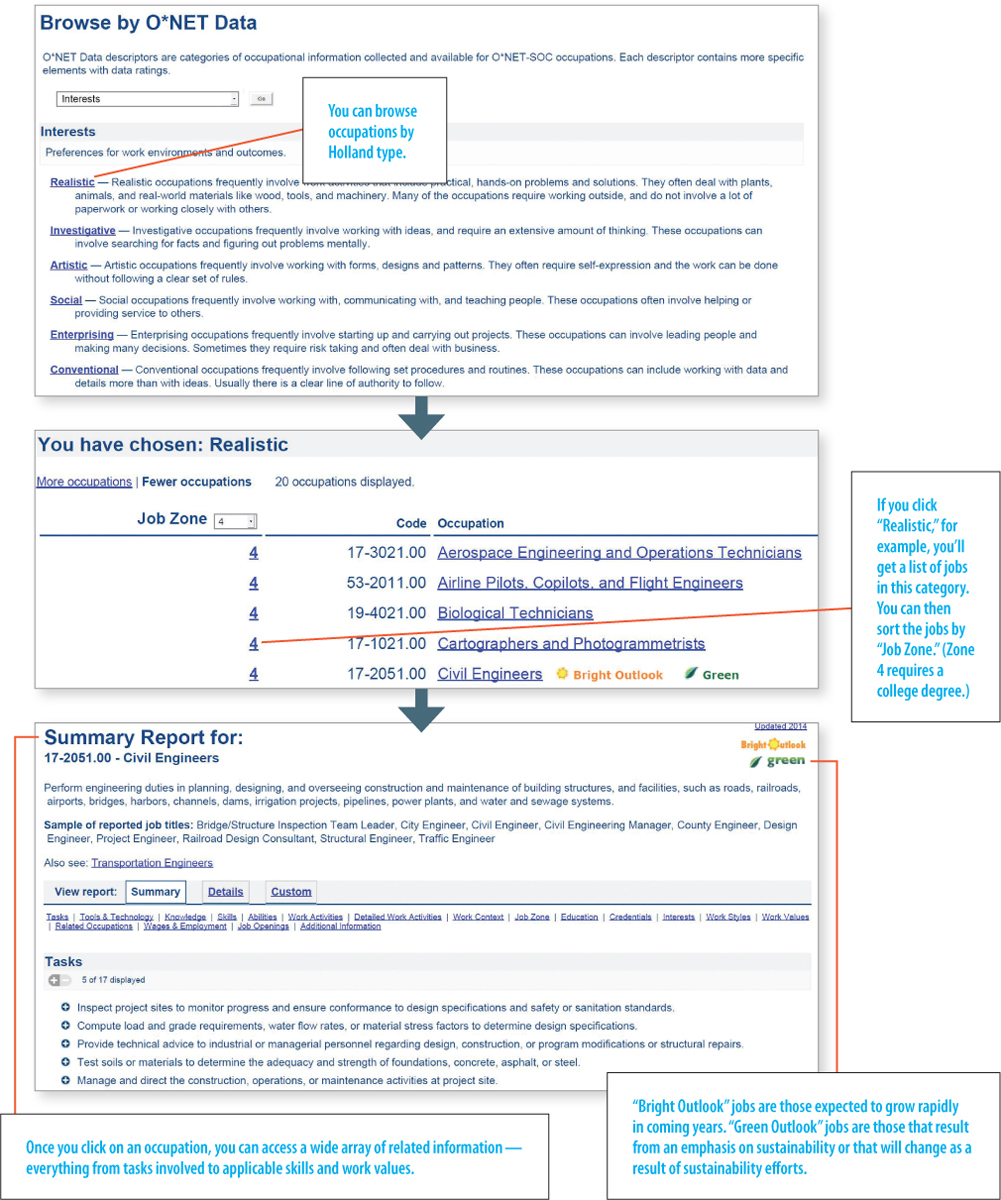Investigate Career Options

So far you’ve explored your interests, work values, and skills, and you’ve learned how to create an academic plan. What’s next? You can use these insights to investigate career options by conducting online research, talking with experts, and getting direct experience that will help you discover more about careers of interest (see Figure 13.2). You’ll use your critical thinking skills to gather, evaluate, and use all this information in a way that makes the most sense for you.
As you gather information, try not to put too much pressure on yourself to pick the “right” career. For some students, making an initial career decision is a paralyzing process, because it feels like this one choice could dictate the rest of their lives. In reality, career decisions are more flexible: You make the choice, evaluate how it feels for you, and change it if you don’t like it! In fact, many people change careers several times during the course of their lives. So view the information-gathering experience as just one step toward a satisfying career.
FURTHER READING: Many states also have career-related Web sites (e.g., utahfutures.org). Students can search for specific career options and find out the job outlook, required skills and abilities, preparation, daily tasks, common activities, wages, and related occupations.
Get to Know the O*NET
Probably the best place to start researching different occupations is the O*NET (Occupational Network), an occupational database maintained by the U.S. Department of Labor. It’s chock-full of helpful job-related facts, including how certain occupations match people’s interests, work values, and skills. Drawing on your self-knowledge, you can search for jobs that meet the criteria you consider most important. You can also use the O*NET to research what level of education and experience is required for a particular occupation (a category called the Job Zone), how much the occupation pays, and its occupational projection for the next ten years, which predicts how many of those jobs may be available when you graduate. You can also search for occupations by keyword, such as the name of your college major.
Occupational Projection: The predicted rise or fall in the number of new jobs in a particular field.
For a more detailed look at the O*NET, see Figure 13.3, which shows how to search for occupations using the results of the Holland interest inventory. An activity at the end of the chapter also gives you a chance to explore the O*NET firsthand.
These O*NET screenshots show a search for occupations by Holland interest type; a list of occupations sorted by Job Zone; and a summary report for a particular occupation. You can also search the O*NET by work values or skills.

Talk with Experts
As a college student, you have access to a wide range of experts who can help you with career planning, including career counselors on campus and people in the work world who can give you the “inside scoop” on particular types of jobs, employers, and careers.
Meet with a Career Counselor. Some students have a hard time defining a career path or feeling confident about the path they’ve chosen. Fortunately, many campuses employ career counselors, specially trained professionals who use career assessments and other resources to help students explore career options, make important career decisions, and manage any related stress they’re experiencing. Career counselors, who usually work in the campus’s counseling or career center, can connect you with all kinds of useful information. Services at these centers often include:
Career Counselor: A specially trained professional who uses career assessments and other resources to help students explore career options and make career decisions.
Individual meetings with career counselors
Workshops or groups designed to help you with specific concerns, such as how to structure your job search process
Subscriptions to online career information resources (often based on the O*NET), which can include interest assessments and video interviews with people working in various occupations
Tools for creating your résumé
Tips for preparing for job interviews
FOR DISCUSSION: Ask students: What do you think of when you think about career counseling? What barriers may prevent people from seeking career counseling? What are some potential solutions to these barriers? Why would it be better to see a career counselor sooner rather than later?
Why not seize the day? Visit your school’s counseling or career center this week to find out how counselors can help you investigate career options.
Conduct Informational Interviews. You can also get valuable job information from someone currently working in a career that interests you. By conducting an informational interview, or conversation, with a person working in a particular field, you can get “insider information” about what a job is really like from day to day.
ACTIVITY: If your school has a career center, visit the center as a class. Often, career centers are willing to host classes to educate students about their services and the benefits of working with career counselors. If your campus doesn’t have career counseling available, discuss other ways students might obtain the information they need.
To find someone working in a field of interest, get referrals from friends and family, ask your instructors, and review alumni mentor lists at your school’s career center. When you first contact this person, be sure to explain that you’re looking for an informational interview, either face-to-face or by phone. This is a fact-finding investigation — your purpose is not to job hunt but rather to find out what the work entails, what this person likes most and least about the job, and what benefits and opportunities for advancement this line of work offers. Table 13.2 shows questions you might ask during informational interviews.
| What kinds of tasks do you perform in a typical week? |
| How does this career affect your lifestyle? |
| What are some of the more difficult or frustrating parts of this career? |
| What are the best parts of your job? |
| Is this career changing? How? |
| Do you usually work independently or as part of a team? |
| Do you have any advice regarding how someone interested in this career should prepare? |
| What types of advancement opportunities are available for an entry-level worker in this career? |
| What is the average starting salary for someone in this career? |
ACTIVITY: A good place to “e-meet” people in a chosen profession is LinkedIn. If your class is unfamiliar with this Web site, give a brief demonstration and encourage students to set up their own professional profile.
Get Experience
Even while you’re in college, you can gain experience that helps you learn more about careers of interest, and even start building the skills you’ll need to succeed in those jobs. Consider these ideas:
ACTIVITY: Remind students of the importance of sending a thank-you note or e-mail after they have completed their informational interview. This is a great way to stand out from the crowd. Also, suggest that students request a business card for future reference.
Service learning. Most colleges and universities offer service learning opportunities that pair a practical service experience with formal classroom discussions and assignments. For example, if Rhonda is interested in health care management and psychology, she could sign up for a service learning class working with senior citizens in a local nursing home. Through this experience, she would learn about nursing facility management while also helping the residents.
Internships. Internships — formal programs that provide practical experience for beginners in an occupation or a profession — are another worthwhile option. In fact, recent research suggests that students who graduate with internship experiences receive more job offers and higher starting salaries than those without these experiences.4 Internships are often available during the summer, though some come up during the academic year. Check with a career counselor at your school to find out which nearby organizations offer internship opportunities.
Co-ops. College co-op programs offer alternating periods of academic study and periods of work experience in fields such as business, industry, government, and social services. These programs are a great way to learn about specific careers while also making a little money. In addition, during your work experiences you may forge helpful connections with people who can help you later — for example, when you’re seeking job opportunities or when you need letters of recommendation for a potential employer.
Working. Working while you’re in college allows you to investigate career options as you build your skills and knowledge. The key is not to take on so many hours that you have difficulty juggling your coursework and your job.
